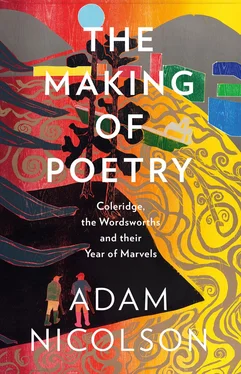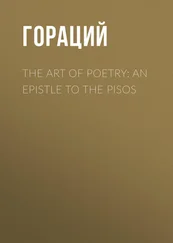1 ...6 7 8 10 11 12 ...21 He made visits to London and Bristol, and on one of them, probably through the Pinneys, he met Coleridge and began to show him and send him the poetry he was writing. Coleridge’s letters to him from that time have disappeared, but through the course of 1796 it seems as if, perhaps under Coleridge’s habit of encouragement, Wordsworth began to emerge from the darkness, and to feel his powers returning as both a man and a poet.
Pieces survive in his notebooks from that year, never shown to anyone, in a form of almost undecorated poetry, never published, surviving only as fragments of rough manuscript on the back of sheets containing other lines. One describes an incident on the road outside Racedown, a transient scene reminiscent of the encounter with the poor girl with the heifer in the Loire valley five years before. A baker from Clapton, just outside Crewkerne, used to deliver to houses in the area, and regularly came past Racedown. The speaker begins by addressing a young woman he has met in the road:
I have seen the Baker’s horse
As he had been accustomed at your door
Stop with the loaded wain, when o’er his head
Smack went the whip, and you were left, as if
You were not born to live, or there had been
No bread in all the land. Five little ones,
They at the rumbling of the distant wheels
Had all come forth, and, ere the grove of birch
Concealed the wain, into their wretched hut
They all return’d. While in the road I stood
Pursuing with involuntary look
The Wain now seen no longer, to my side
came, pitcher in her hand
Filled from the spring; she saw what way my eyes
Were turn’d, and in a low and fearful voice
She said – that wagon does not care for us –
That wagon does not care for us. This is unfinished: he addresses the woman, but then describes to her the scene she would just have witnessed herself. She begins by standing next to her hut, but then arrives from the spring with her pitcher. Nor can he name her – Wordsworth left a blank at the beginning of the line. But in its under-qualities, its directness and the simplicity of its language, its rhymeless pentameters without an abstract noun or any large Miltonic reference to the important or the exotic, one part of what would happen this year is already underway. This is the first signpost towards Wordsworth’s future as a poet. The truth of her statement – that wagon does not care for us – emerges from under the carapace of the brutalised-civilised. It seems as if poetry, allied to the language of the real, can do what politics and revolution can never manage: make vivid and present the reality of suffering, of human experience, for which no exaggerated language or theatrics are required.
No graph of a life pursues a single line, and the man Coleridge had come to see and be with, to admire and encourage, is a hazy compound of mentalities and influences. With his hair cut short in the republican manner, and a heavy stubble on his cheek, there was an intense, haunted and self-possessed air to him. The artist Benjamin Robert Haydon later said that there was something ‘lecherous, animal & devouring’ in Wordsworth’s laugh, and there is no doubt of the almost predatory power that hung about him. He would always control anyone who came into his orbit. And his erotic life was real and vivid. When, later, after ten years of marriage, he was away from his wife for a few days, he wrote to her: ‘I tremble with sensations that almost overpower me,’ his mind filled with images and memories of ‘thy limbs as they are stretched upon the soft earth’ and ‘thy own involuntary sighs and ejaculations’.
The writing of poetry could take hold of him in what he called ‘the fit’, the need to get it down before it left his mind. His sister Dorothy watched him one morning at breakfast:
he, with his Basin of Broth before him untouched & a little plate of Bread & butter.
He had not slept well, but the idea of a poem had come to him.
He ate not a morsel, nor put on his stockings but sate with his shirt neck unbuttoned, & his waistcoat open while he did it. The thought first came upon him as we were talking about the pleasure we both always feel at the sight of a Butterfly. I told him that I used to chase them a little, but I was afraid of brushing the dust off their wings, & did not catch them – He told me how they used to kill all the white ones when he went to school because they were Frenchmen …
Uniforms in the armies of Bourbon France had been white, decorated with golden fleur-de-lis, and any right-thinking English boy in the 1770s would have pursued them with a vengeance. Wordsworth was remembering that from the other side of a revolution that had replaced the white with the tri-colour, but in this tiny scene, away from public view or the need to present himself as he might have wanted to be known, something of the undressed Wordsworth appears: quietly and gently witty, preoccupied, getting up late, needing to catch the moment of writing a poem before it fled, his memories and the present moment interacting as two dimensions of one life, calmly there in the room but, in the writing of that poem, entirely removed, alone.
One further element reflects on Wordsworth in the late 1790s. In the archive at Dove Cottage in Westmorland is the extraordinary and rare survival of some of his clothes. His waistcoats and breeches from the last years of the eighteenth century open a shutter on to this gentleman-poet, governor-radical, man of the people who was also a man, in his own mind, set far above them. Much of the poetry he would write this year was intended, as he said, ‘to shew that men who did not wear fine cloaths can feel deeply’, and one might imagine that a poet who wrote those words might also wear the fustian and the grosgrain of the working man.
He did not. In Grasmere you can find his cream waistcoat with linen back and silk front, with a kind of spreading collar and decorated with embroidered flowers, its pockets edged with red braid, its twelve fabric-covered metal buttons each decorated with a flower. Beside it is a matching suit of waistcoat and breeches also in cream silk, this waistcoat with a stand-up collar, two small pockets with scallop-edged flaps, and eleven small buttons covered in fabric. The breeches are knee-length, gathered into a band at the knee and secured by four fabric-covered buttons and a strap fastening. A third waistcoat is in ivory silk, decorated in careful pale-blue, red and white embroidery, scattering his chest and stomach with perfect, crystalline lilies of the valley.
Are these really the clothes of the man who would write The Prelude ? Was Wordsworth a dandy? In Germany late in 1798, according to his sister, he went out ‘walking by moonlight in his fur gown and a black fur cap in which he looks like any grand Signior’. The gown was green, ‘lined throughout with Fox’s skin’. At other moments he would appear in ‘a blue spencer’, a short double-breasted overcoat without tails, and a new pair of pantaloons. Perhaps one can see in this elegance and this air of distinction, this distance from mud and toil, a picture of the man who was living in Racedown and considering his position as an un-acknowledged legislator of the world, preparing to convey to that world his vision of completeness and authority. ‘The Poet binds together by passion and knowledge the vast empire of human society, as it is spread over the whole earth …’, he would write a year or two later. There is no retreat in those magnificent words to a cosy provincial irrelevance. The ambition is explicitly imperial. Here is a man who wanted to establish a form of poetry whose ligatures would bind up the whole of existence.
His sister Dorothy, part-hidden, is at the centre of this year. There is a surviving silhouette of her: small and bright, sharp, attentive, slight-bodied. Her hair is bound up, her whole being taut. A high lace collar, curly hair on her brow. Delicate, poised, a small bosom, half-open lips, drawn in this silhouette with all the expectations of femininity, her presence almost toylike, but nothing skittish or girlish: careful, exact, intelligent, enquiring.
Читать дальше












